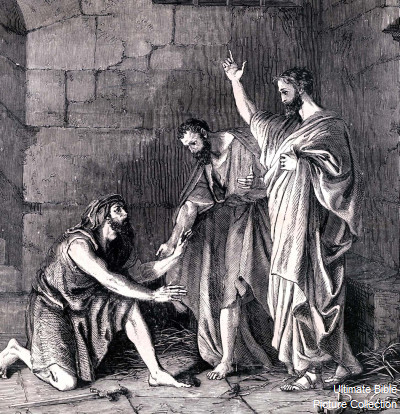
Among law enforcement professional,
corrections officers are a rare and freaky breed. I once knew a lady back in
Los Angeles who served on the LAPD. She’d started in corrections, but found
after a very short time she had to get out. Jailers (guards, bulls, screws,
turnkeys, or whatever they’re called) are regularly subject to the threat of
physical harm or death, vile verbal abuse, and attempts at manipulation. They
are overworked, underpaid, scrutinized constantly by supervisors, threatened by
inmates, and need to be 100% vigilant 100% of the time. When they’re not being
totally stressed-out, they’re probably bored mindless by the repetitive nature
of their work. When I visit the local hospital and see the Philadelphia Department
of Prisons officers sitting vigil outside the rooms of hospitalized prisoners,
I always try to stop and thank them for their service. They’re often grateful
for the gesture. When I’ve visited inside
the county jail—and every urban pastor will do this at some point—the guards
are far less pleasant. It takes a special individual to be able to do this job
day in and day out. Many corrections officers just burn out or move on to other
areas of law enforcement.
I rather feel sorry for the prison guard
in the First Lesson appointed for Easter 7 in the Revised Common Lectionary
(Acts 16:16-34). He has total responsibility over his jail—even over stuff he
can’t control like the earthquake in verse 26. The poor guy has to see that the
prisoners don’t escape. Should they get out for any reason, he is required—quite literally—to fall on his sword and
kill himself. Can you imagine? The stress of this job must’ve made him one brutal
s.o.b. Note that Paul and Silas, who have just been pretty savagely beaten, are
put in chains in the dungeon without any medical attention whatsoever.
The un-named jailer has no conception of
mercy. He figures that prisoners will always run when they get a chance, and he
doesn’t even check their cell after the massive quake. He just gives up. He figures they’re gone,
and gets ready to off himself. Maybe he just wants the whole stressful business
to be over with. But Paul and Silas don’t want him to harm himself, because his
suicide will not glorify God. Prisoners or not, victims or not, they are in the
business of proclaiming salvation, and salvation doesn’t speak through despair
or revenge or fear.
Salvation speaks through love, and love
speaks through compassion and forgiveness.
The mercy shown to this man through two
imprisoned Christians caused him to ask the question, “What must I do to be
saved (v.30)?” The answer given to him was to believe, which makes perfect sense if you consider that the
opposite of belief is doubt, and doubt is uncertainty. We will learn to fear
that which we don’t know, don’t understand, or can’t control, and the devil
will ultimately teach us to hate what we fear. I love the fact that the jailer’s
family rejoices that he has become a
believer (v.34). I suspect he must’ve been very had to live with before two
prisoners’ act of kindness brought him to salvation.
The jailer has been saved. The man who
keeps prisoners sees his own bondage, and chooses to rise above it. He sees the
prisoners no longer as enemies, but as fellow humans. He even dresses their
wounds, takes them home, and feeds them—culturally acknowledging them as
members of his family. Salvation, in this sense, is so much more than going to Heaven
when you die. It is a liberation which comes immediately through our one-ness
in Christ. This one-ness is unlike any other type of association, because it
does not define us over and against another group. In Christ, there is no “them”
and "us.” There is only “us.” And we are called to see Christ in others and be
Christ for others.
The salvation which this man experiences
lets the jailer out of the jail he and his culture have made for him. He is
saved from suspicion, prejudice, guilt, depression, and an incessant need to
dominate and control. He is freed from fear, because the promise of God’s love
is certain.
Thanks for reading, friends. I always like
it when you stop by. If you’d like to read a really cool insight on “salvation,”
check out Peter Marty’s article in the current issue of Living Lutheran. You can read it online if you click his name here:
Peter Marty. Just click on the table of contents and look for "Lexicon of Faith" on page 5.
No comments:
Post a Comment